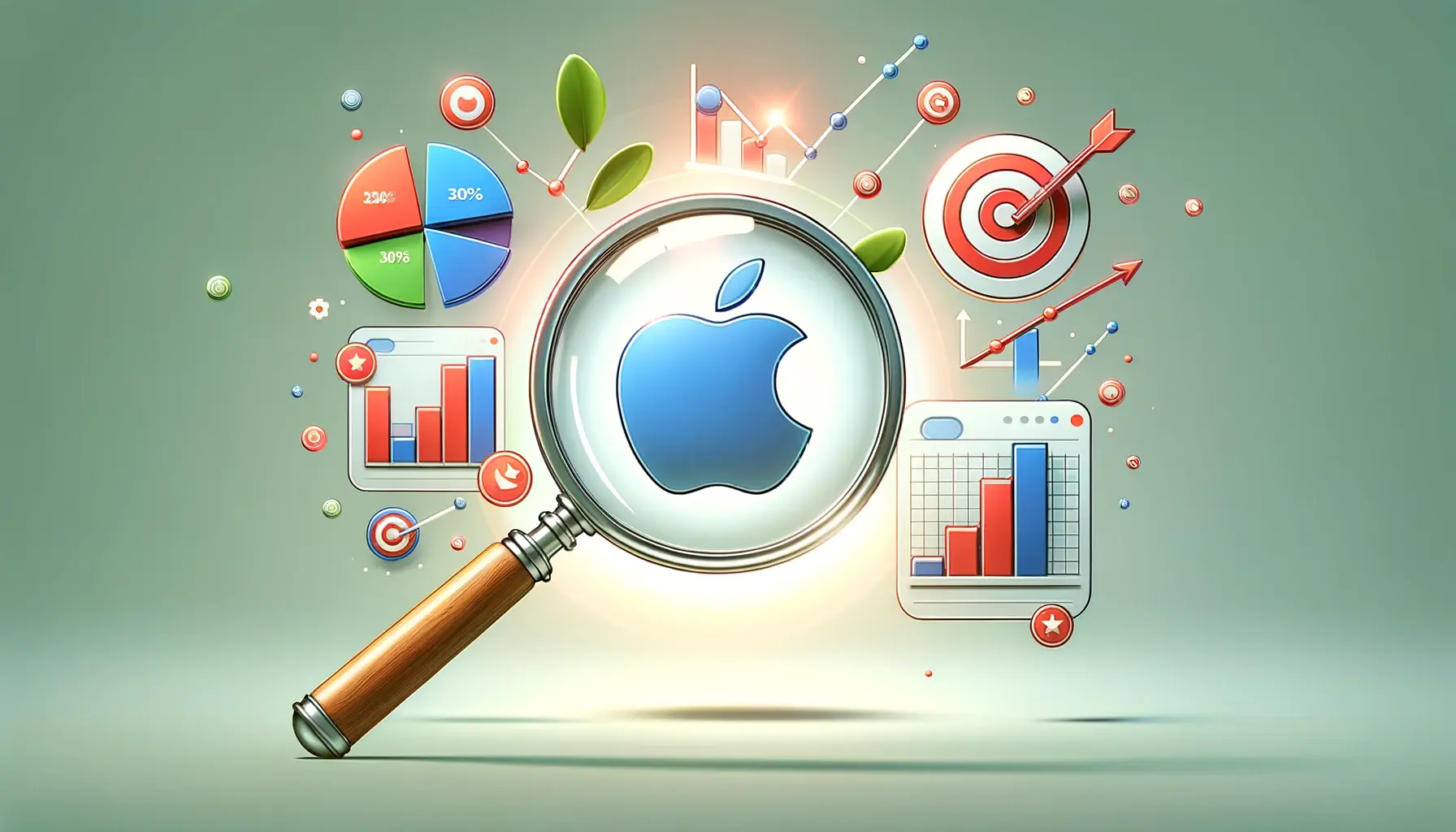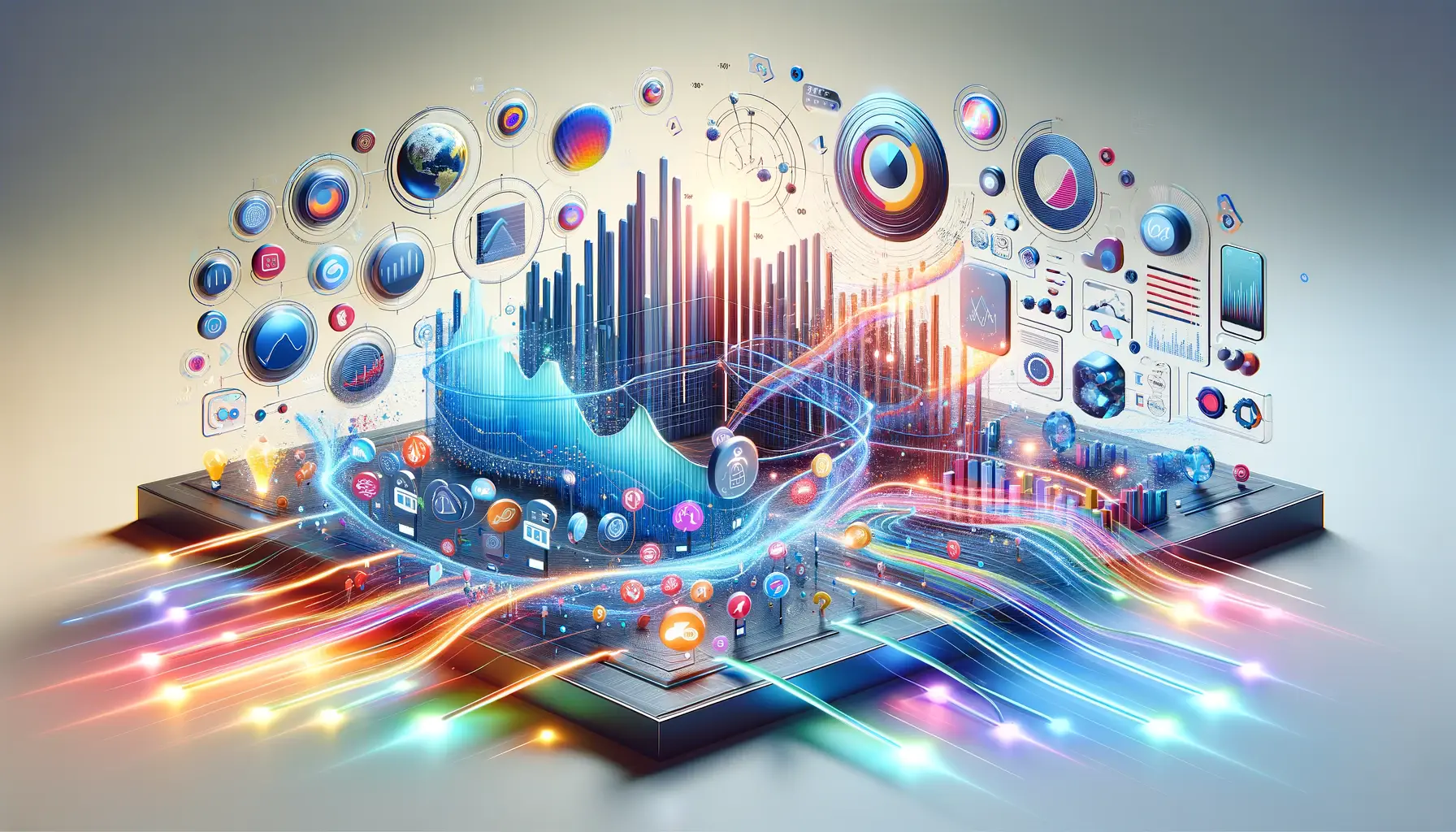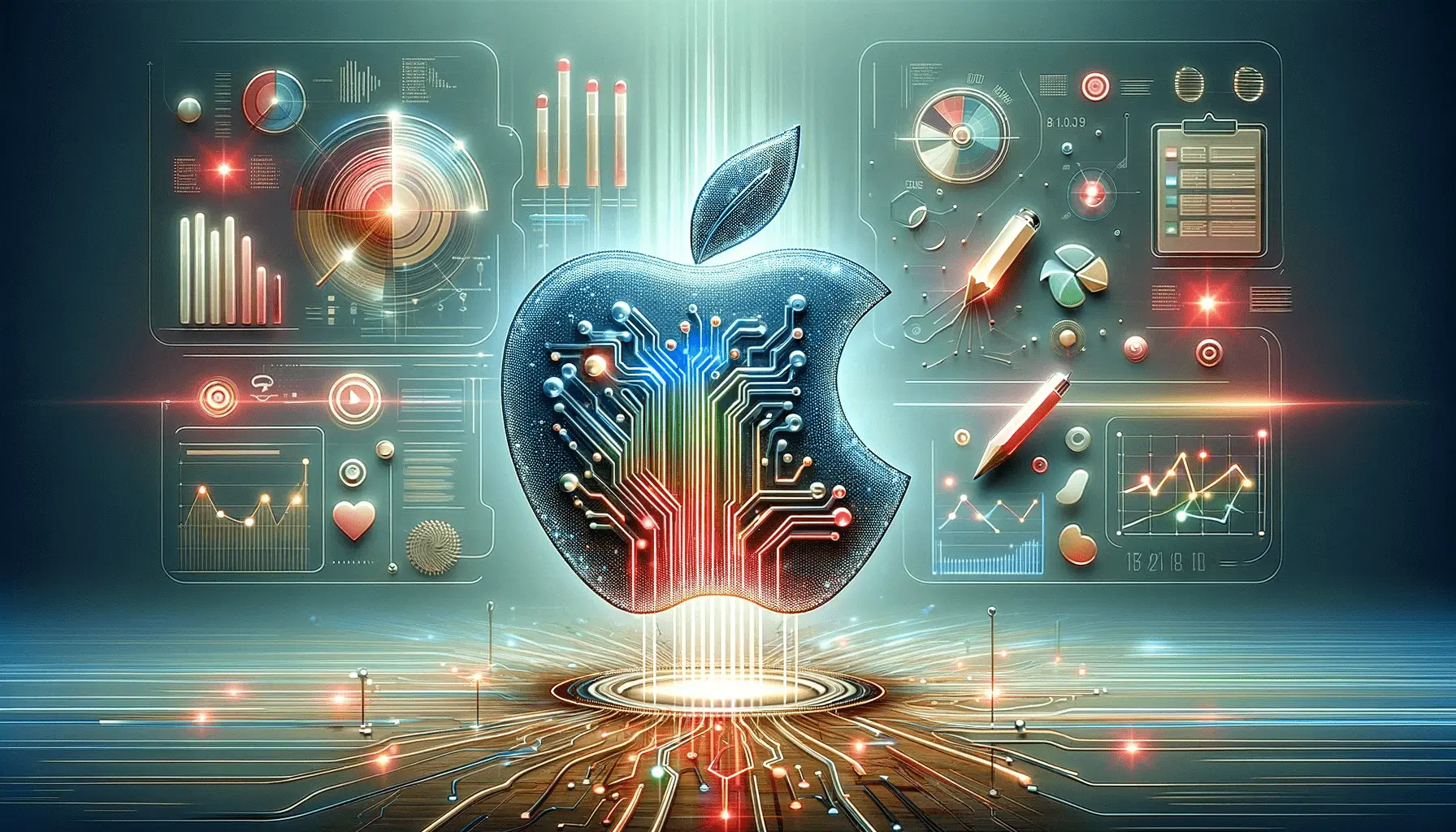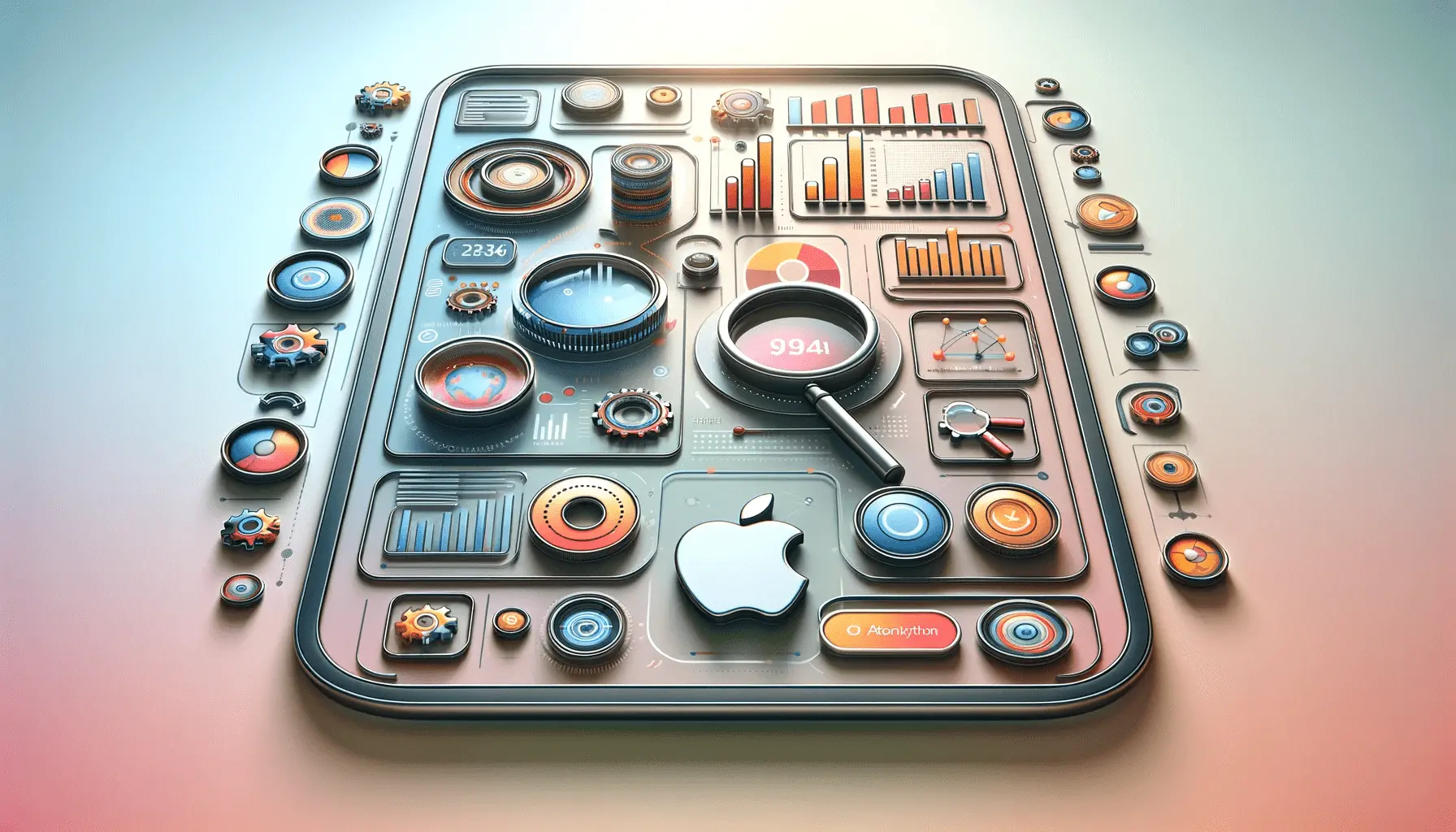The advent of artificial intelligence (AI) has revolutionized numerous industries, with digital marketing and advertising standing at the forefront of this transformation.
AI’s integration into ad campaign optimization has not only streamlined operations but also enhanced the effectiveness and efficiency of advertising strategies.
This evolution marks a significant shift from traditional methods, paving the way for a new era where data-driven insights and automation lead the charge in creating impactful ad campaigns.
In the realm of Apple Search Ads Campaign Optimization, AI’s role is increasingly becoming indispensable.
By leveraging AI, marketers can now predict consumer behavior, personalize ad content, and optimize bidding strategies in real-time.
This not only maximizes the return on investment (ROI) but also ensures that the ads reach the right audience at the right time, thereby increasing the chances of conversion.
The following sections delve deeper into how AI is shaping the future of ad campaign optimization, focusing on its application within the Apple Search Ads framework.
- Understanding AI in Digital Marketing
- Key Technologies Behind AI in Advertising
- Personalization and Targeting with AI
- Optimizing Ad Spend with AI
- Enhancing Creativity and Content with AI
- AI in Customer Journey Optimization
- Future Trends in AI-Driven Advertising
- Embracing the Future with AI in Ad Campaign Optimization
- FAQs on AI in Ad Campaign Optimization
Understanding AI in Digital Marketing
The Basics of AI in Advertising
At its core, AI in advertising involves the use of machine learning algorithms and data analytics to predict user behavior, automate ad placements, and optimize marketing strategies.
This technology processes vast amounts of data at an unprecedented speed, enabling marketers to gain valuable insights into customer preferences and trends.
AI’s predictive capabilities allow for the anticipation of future consumer actions, thereby facilitating the creation of more targeted and effective ad campaigns.
AI-driven tools can segment audiences based on demographics, interests, and online behavior, ensuring that marketing messages are tailored to meet the specific needs of different user groups.
This level of personalization enhances the user experience and significantly improves engagement rates.
Furthermore, AI’s real-time optimization capabilities ensure that ad campaigns are constantly adjusted based on performance data, maximizing efficiency and reducing wasted ad spend.
AI’s Impact on Campaign Performance
The implementation of AI in ad campaign optimization has led to remarkable improvements in campaign performance.
By analyzing past campaign data, AI can identify which strategies yielded the best results and suggest adjustments for future campaigns.
This not only reduces the guesswork involved in planning ad campaigns but also helps in allocating the marketing budget more effectively.
As a result, businesses can achieve higher conversion rates and better ROI on their advertising efforts.
Moreover, AI’s role in detecting and preventing ad fraud cannot be overstated.
By identifying suspicious patterns and behaviors, AI helps in safeguarding the integrity of ad campaigns, ensuring that marketers get genuine engagement and accurate performance metrics.
This level of security is crucial in maintaining the trust of advertisers and optimizing the allocation of advertising resources.
AI’s integration into digital marketing and advertising heralds a new era of efficiency, personalization, and data-driven decision-making, significantly enhancing the ROI of ad campaigns.
Key Technologies Behind AI in Advertising
The landscape of AI in advertising is built upon several key technologies, each contributing to the optimization and personalization of ad campaigns.
These technologies not only automate mundane tasks but also provide deep insights into consumer behavior, enabling marketers to craft campaigns that resonate well with their target audience.
Understanding these technologies is crucial for leveraging AI’s full potential in ad campaign optimization.
Machine Learning and Predictive Analytics
Machine learning (ML) stands at the core of AI’s success in advertising.
It involves algorithms that learn from data over time, improving their accuracy in predicting user behavior and campaign outcomes.
Predictive analytics, a subset of ML, uses historical data to forecast future actions, helping marketers to anticipate trends and make informed decisions.
Together, they enable:
- Enhanced targeting and segmentation
- Dynamic content personalization
- Optimized bidding strategies for ad placements
Natural Language Processing (NLP)
Natural Language Processing (NLP) allows AI systems to understand and interpret human language, making it possible to analyze customer feedback, social media conversations, and search queries.
This technology is instrumental in:
- Improving customer service through chatbots and virtual assistants
- Generating creative ad copy that resonates with the target audience
- Optimizing content for SEO and voice search
Computer Vision
Computer vision enables AI to interpret and analyze visual content, from images to videos, playing a significant role in:
- Brand logo detection in digital media
- Content moderation by filtering inappropriate or irrelevant images
- Visual trend analysis to inform creative strategies
Deep Learning
Deep learning, a more advanced branch of machine learning, mimics the neural networks of the human brain to process data in complex ways.
It enhances AI’s capabilities in:
- Understanding intricate patterns in user behavior
- Facilitating advanced image and speech recognition
- Generating lifelike synthetic media for hyper-realistic ad creatives
The synergy of these technologies under the AI umbrella transforms how ad campaigns are designed, executed, and optimized, leading to unprecedented levels of personalization and efficiency.
Personalization and Targeting with AI
The power of AI in enhancing ad campaign personalization and targeting cannot be overstated.
By harnessing the vast amounts of data available on consumer behaviors and preferences, AI enables marketers to deliver highly personalized ad experiences to each segment of their audience.
This level of customization is key to engaging customers in a meaningful way, driving higher conversion rates and fostering brand loyalty.
AI-driven personalization and targeting involve several key strategies and tools, each contributing to the creation of more relevant and effective ad campaigns:
Dynamic Content Creation
AI tools analyze user data to generate dynamic ad content that resonates with individual preferences and behaviors.
This includes:
- Customizing ad copy and visuals based on user interests
- Adapting messaging and offers in real-time to match user engagement levels
- Creating multiple variations of ads for A/B testing to determine what works best for different audience segments
Behavioral Targeting
Behavioral targeting leverages AI to analyze past user actions, such as website visits, purchase history, and social media interactions, to predict future interests and needs.
This enables marketers to:
- Segment audiences more accurately based on predicted behaviors
- Deliver ads that are highly relevant to each user’s current stage in the buying journey
- Enhance retargeting strategies by predicting and addressing potential customer churn
Lookalike Audience Expansion
AI algorithms can identify patterns in the characteristics and behaviors of a brand’s existing customers to find new prospects with similar profiles.
This approach allows for:
- Expanding reach to potential customers who are likely to be interested in the brand’s offerings
- Increasing the efficiency of ad spend by targeting users with a higher propensity to convert
- Streamlining the audience expansion process, saving time and resources
Real-Time Bidding Optimization
AI enhances programmatic advertising through real-time bidding (RTB) optimization, dynamically adjusting bid amounts based on the likelihood of conversion.
This process ensures:
- Maximized ad visibility at the optimal cost
- Improved ROI through intelligent bid strategies
- Ad placements that are more likely to engage and convert the target audience
The integration of AI in personalization and targeting not only elevates the relevance and effectiveness of ad campaigns but also significantly improves the overall user experience, setting the stage for deeper customer engagement and loyalty.
Optimizing Ad Spend with AI
One of the most critical aspects of ad campaign management is the efficient allocation and optimization of ad spend.
AI plays a pivotal role in ensuring that every dollar spent on advertising yields the highest possible return.
Through sophisticated algorithms and real-time data analysis, AI systems can make precise adjustments to ad strategies, ensuring optimal use of resources.
AI-driven ad spend optimization encompasses several key areas, each contributing to the overall effectiveness and efficiency of digital advertising campaigns:
Budget Allocation Across Channels
AI analyzes performance data across all advertising channels to determine where ad spend can be most effectively allocated.
This involves:
- Identifying high-performing channels that offer the best ROI
- Shifting budgets away from underperforming channels to maximize overall campaign effectiveness
- Continuously monitoring channel performance to adjust allocations in real time
Cost-Per-Click (CPC) and Bid Optimization
By leveraging AI, marketers can optimize CPC and bids for each ad placement.
AI systems can:
- Analyze historical data to set optimal bids for different keywords and ad placements
- Adjust bids in real-time based on competition and ad performance
- Ensure that marketers do not overpay for clicks, maximizing the cost-efficiency of campaigns
ROI and Conversion Rate Optimization
AI tools focus on improving the ROI and conversion rates of ad campaigns by:
- Identifying the most effective ad creatives, messaging, and calls-to-action through A/B testing
- Optimizing landing pages and user journeys to improve conversion rates
- Using predictive analytics to forecast campaign performance and make proactive adjustments
Fraud Detection and Prevention
Ad fraud can significantly drain ad budgets without delivering any real value.
AI helps combat this issue by:
- Identifying suspicious patterns that may indicate fraudulent activity
- Automatically blocking traffic from known sources of ad fraud
- Ensuring that ad spend is directed towards genuine user engagement and conversions
AI’s ability to optimize ad spend not only enhances the financial efficiency of ad campaigns but also contributes to a more strategic and targeted approach to digital advertising, leading to better outcomes and higher returns on investment.
Enhancing Creativity and Content with AI
The creative aspect of advertising, encompassing ad copy, visuals, and overall campaign themes, is crucial for engaging the audience and conveying the brand’s message effectively.
AI’s role in enhancing creativity and content in advertising campaigns is transformative, enabling marketers to produce more relevant, personalized, and impactful ads at scale.
AI’s contribution to creative content development in advertising includes several innovative approaches:
Automated Content Creation
AI tools can generate ad copy, headlines, and even creative visuals based on predefined parameters and data insights.
This automation:
- Speeds up the creative process, allowing for rapid testing and iteration of ideas
- Ensures content relevance by tailoring messages to specific audience segments
- Supports A/B testing with a variety of creative options to determine what resonates best with the target audience
Personalized Ad Experiences
Through data analysis and machine learning, AI enables the creation of highly personalized ad experiences.
This personalization:
- Increases engagement by delivering content that aligns with individual preferences and behaviors
- Enhances customer loyalty by making users feel understood and valued by the brand
- Improves conversion rates by presenting offers and messages that are directly relevant to each user
Visual and Voice Search Optimization
AI’s capabilities extend to optimizing content for visual and voice search, two rapidly growing areas in digital marketing.
This optimization:
- Ensures brands remain visible in next-generation search platforms
- Adapts content to the nuances of voice search queries and visual search trends
- Expands the reach of campaigns to new audiences using emerging technologies
Dynamic Creative Optimization (DCO)
DCO uses AI to automatically adjust ad creatives based on real-time performance data and user interactions.
This dynamic approach:
- Maximizes the relevance and impact of ads across different platforms and devices
- Allows for seamless optimization of creative elements to drive better campaign performance
- Reduces the manual effort required to test and refine ad creatives
AI not only streamlines the creative process in advertising but also unlocks new possibilities for personalization and engagement, setting a new standard for content relevance and impact in digital marketing campaigns.
AI in Customer Journey Optimization
The customer journey, from awareness to conversion and beyond, is a critical focus area for marketers aiming to optimize their advertising strategies.
AI plays a crucial role in mapping and enhancing this journey, ensuring that each touchpoint is personalized, engaging, and effective in driving conversions.
By analyzing data and predicting customer behavior, AI enables marketers to create a seamless and highly targeted experience across all stages of the customer journey.
Key applications of AI in customer journey optimization include:
Mapping Customer Touchpoints
AI algorithms analyze customer interactions across various channels to identify key touchpoints in the buying journey.
This analysis helps marketers to:
- Understand the paths customers take from initial awareness to purchase
- Identify opportunities for engagement and personalization at each stage
- Optimize touchpoints for better user experience and higher conversion rates
Personalized Recommendations
Using machine learning, AI can offer personalized product or content recommendations to users based on their past behavior, preferences, and purchase history.
This personalization:
- Increases the relevance of marketing messages, enhancing customer engagement
- Drives sales by suggesting products or services that users are likely to be interested in
- Improves customer satisfaction by making the shopping experience more convenient and tailored to individual needs
Predictive Customer Behavior Modeling
AI’s predictive analytics capabilities allow marketers to forecast future customer actions, enabling proactive engagement strategies.
This modeling:
- Helps in anticipating customer needs and addressing them effectively
- Enables the delivery of timely and relevant marketing messages
- Increases the chances of conversion by engaging customers at the right moment with the right offer
Automated Customer Support
AI-powered chatbots and virtual assistants provide 24/7 customer support, answering queries and offering assistance throughout the customer journey.
This automation:
- Enhances customer experience by providing instant support and guidance
- Reduces the workload on human customer service teams, allowing them to focus on more complex issues
- Collects valuable data on customer questions and concerns, informing future marketing strategies
Integrating AI into the customer journey not only optimizes each interaction but also builds a deeper understanding of customer needs and preferences, leading to more effective and successful marketing campaigns.
Future Trends in AI-Driven Advertising
The future of advertising is being shaped by rapid advancements in AI technology.
As we look ahead, several emerging trends are set to redefine how brands engage with their audiences, optimize their ad campaigns, and measure success.
These trends highlight the growing importance of AI in creating more intelligent, responsive, and personalized advertising ecosystems.
Exploring these future trends offers insights into the evolving landscape of digital marketing and the opportunities AI presents for innovative advertising strategies:
Augmented Reality (AR) and AI Integration
AR technology, combined with AI, is poised to offer immersive ad experiences that blur the lines between digital and physical worlds.
This integration will:
- Enable brands to create interactive and engaging ad campaigns that captivate users
- Offer personalized experiences based on user location, behavior, and preferences
- Transform product visualization and try-on experiences, enhancing the decision-making process
AI-Generated Content
The use of AI to generate creative content, including text, images, and videos, will become more sophisticated, leading to:
- Highly personalized and relevant ad creatives produced at scale
- Efficient content creation processes that reduce time and costs
- Enhanced A/B testing capabilities with a vast array of creative variations
Privacy-Focused Personalization
As privacy concerns continue to grow, AI will play a crucial role in delivering personalized ad experiences in a privacy-compliant manner.
This will involve:
- Developing advanced targeting strategies that do not rely on third-party cookies
- Using first-party data and AI to understand customer preferences and behaviors
- Creating personalized ad experiences that respect user privacy and data protection regulations
AI in Measurement and Analytics
AI will revolutionize how marketers measure and analyze the performance of their ad campaigns, offering:
- Real-time analytics and insights that guide strategic decisions
- Advanced attribution modeling to accurately assess the impact of different channels and touchpoints
- Predictive analytics to forecast campaign performance and ROI
The integration of AI into advertising is not just about optimizing current practices but also about paving the way for new, innovative approaches that will shape the future of digital marketing. As AI technology continues to evolve, so too will the possibilities for engaging, personalized, and effective advertising.
Embracing the Future with AI in Ad Campaign Optimization
The integration of artificial intelligence into ad campaign optimization is not just a fleeting trend but a fundamental shift in the digital marketing landscape.
As we have explored, AI’s role spans from enhancing creativity and content to personalizing the customer journey, optimizing ad spend, and predicting future trends.
The synergy of AI with digital advertising heralds a new era where efficiency, personalization, and data-driven decision-making become the cornerstones of successful campaigns.
Key Takeaways for Marketers
For marketers looking to stay ahead in a competitive digital environment, embracing AI in ad campaign optimization offers several compelling advantages:
- Unparalleled Personalization: AI’s ability to analyze vast datasets enables the creation of highly personalized ad experiences, significantly improving engagement and conversion rates.
- Efficient Resource Allocation: Through predictive analytics and real-time optimization, AI ensures that ad budgets are spent on the most effective channels and strategies.
- Creative Innovation: Automated content creation and dynamic creative optimization allow for the rapid testing and iteration of creative ideas, enhancing the relevance and impact of ad campaigns.
- Enhanced Customer Insights: AI’s advanced analytics capabilities offer deeper insights into customer behavior, enabling marketers to tailor their strategies more effectively.
Preparing for the AI-Driven Future
As the role of AI in ad campaign optimization continues to grow, marketers must adapt to leverage its full potential.
This involves staying abreast of technological advancements, investing in AI-powered tools, and developing skills in data analysis and machine learning.
Moreover, ethical considerations and privacy compliance should be at the forefront of AI implementation strategies, ensuring that personalization efforts respect user consent and data protection laws.
In conclusion, the future of ad campaign optimization is inextricably linked with AI.
By harnessing the power of artificial intelligence, marketers can unlock new levels of efficiency, creativity, and personalization, driving unprecedented success in their digital advertising efforts.
As we move forward, the integration of AI will not only redefine advertising strategies but also enhance the connection between brands and their audiences, making every ad campaign more impactful and effective.
If you're seeking expertise in Apple Search Ads campaigns, visit our service page for professional management!
FAQs on AI in Ad Campaign Optimization
Explore common inquiries about leveraging artificial intelligence to enhance advertising strategies and outcomes.
Yes, small teams can leverage AI tools for real-time optimization and analytics, making their marketing efforts more efficient and data-driven.
AI-driven optimization uses algorithms to analyze customer data and market trends, enhancing campaign performance and ROI.
AI transforms advertising by enabling personalized experiences, predictive analytics, and efficient ad spend, shaping a more targeted and effective future.
AI increases revenue, reduces costs, and offers competitive advantages by automating and optimizing ad campaigns for maximum impact.
AI intersects with digital marketing by enhancing data analysis, enabling personalized campaigns, and improving decision-making processes.
Common AI tools in marketing include customer data platforms, predictive analytics software, and automated content creation tools.
AI optimizes ad spend by analyzing performance data to allocate budgets efficiently across channels, maximizing ROI.
Benefits include enhanced targeting, increased engagement through personalized content, and improved campaign performance analysis.












